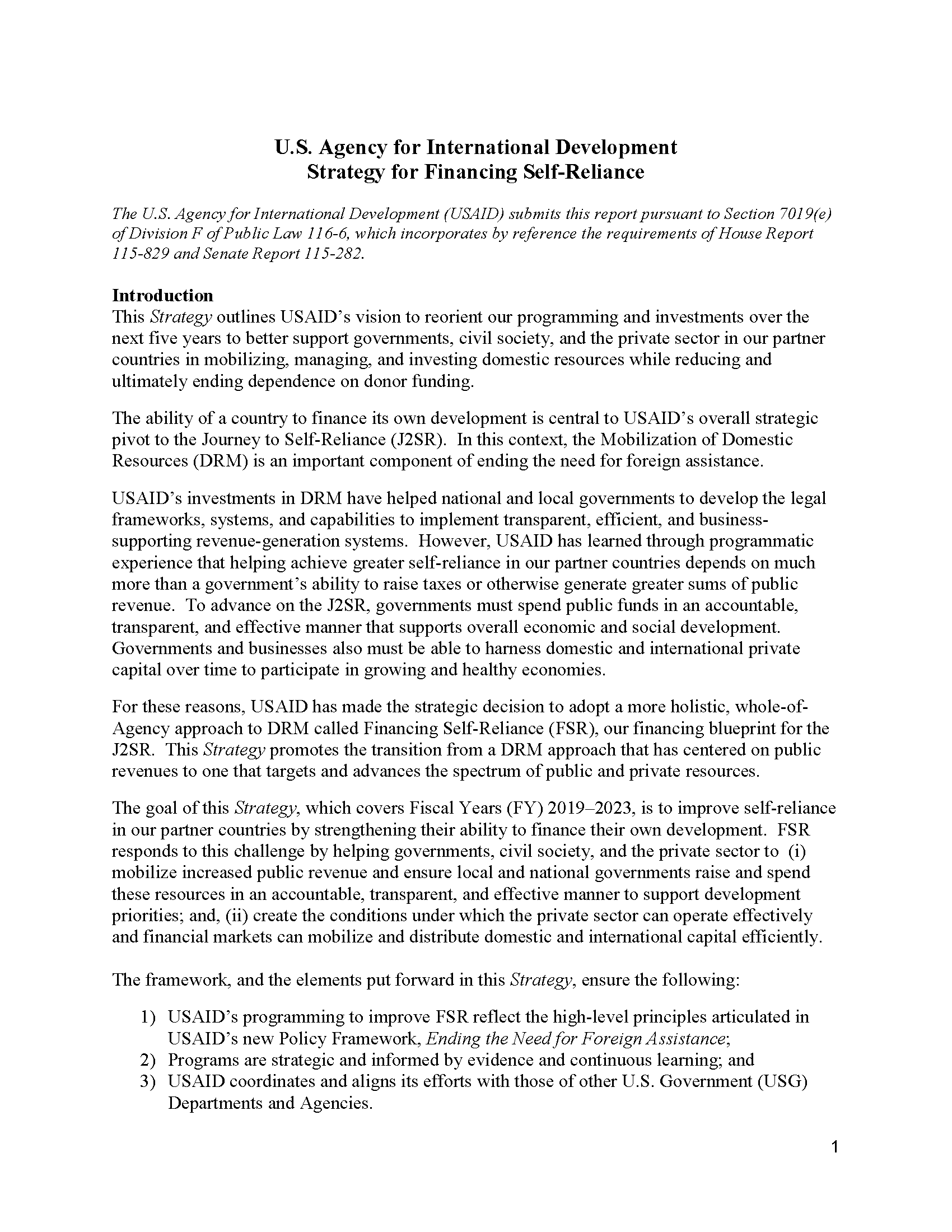Speeches Shim
The U.S. Agency for International Development (USAID) submits this report pursuant to Section 7019(e) of Division F of Public Law 116-6, which incorporates by reference the requirements of House Report 115-829 and Senate Report 115-282.
Introduction
This Strategy outlines USAID’s vision to reorient our programming and investments over the next five years to better support governments, civil society, and the private sector in our partner countries in mobilizing, managing, and investing domestic resources while reducing and ultimately ending dependence on donor funding.
The ability of a country to finance its own development is central to USAID’s overall strategic pivot to the Journey to Self-Reliance (J2SR). In this context, the Mobilization of Domestic Resources (DRM) is an important component of ending the need for foreign assistance.
USAID’s investments in DRM have helped national and local governments to develop the legal frameworks, systems, and capabilities to implement transparent, efficient, and business-supporting revenue-generation systems. However, USAID has learned through programmatic experience that helping achieve greater self-reliance in our partner countries depends on much more than a government’s ability to raise taxes or otherwise generate greater sums of public revenue. To advance on the J2SR, governments must spend public funds in an accountable, transparent, and effective manner that supports overall economic and social development. Governments and businesses also must be able to harness domestic and international private capital over time to participate in growing and healthy economies.
For these reasons, USAID has made the strategic decision to adopt a more holistic, whole-of-Agency approach to DRM called Financing Self-Reliance (FSR), our financing blueprint for the J2SR. This Strategy promotes the transition from a DRM approach that has centered on public revenues to one that targets and advances the spectrum of public and private resources.
The goal of this Strategy, which covers Fiscal Years (FY) 2019–2023, is to improve self-reliance in our partner countries by strengthening their ability to finance their own development. FSR responds to this challenge by helping governments, civil society, and the private sector to (i) mobilize increased public revenue and ensure local and national governments raise and spend these resources in an accountable, transparent, and effective manner to support development priorities; and, (ii) create the conditions under which the private sector can operate effectively and financial markets can mobilize and distribute domestic and international capital efficiently.
The framework, and the elements put forward in this Strategy, ensure the following:
- USAID’s programming to improve FSR reflect the high-level principles articulated in USAID’s new Policy Framework, Ending the Need for Foreign Assistance;
- Programs are strategic and informed by evidence and continuous learning; and
- USAID coordinates and aligns its efforts with those of other U.S. Government (USG) Departments and Agencies.
The J2SR will require long-term commitments from both USAID and governments, civil society, and the private sector in partner countries and, in many of them, will involve efforts that extend beyond the life of this Strategy. However, by the end of FY 2023, USAID expects that staff across all our Operating Units will have the tools, knowledge, and the capacity to integrate FSR across the Agency’s Program Cycle, work collaboratively with USG Departments and Agencies and partners to move countries closer to financial self-reliance, and use data and evidence to help partner countries develop mechanisms to address their financing needs more holistically.


Comment
Make a general inquiry or suggest an improvement.